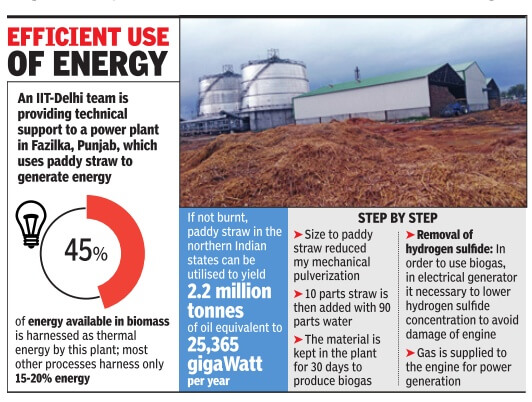
शिक्षित भारत-स्वस्थ भारत- स्वच्छ भारत- स्वावलंबी भारत- संपन्न भारत

IIT-D shows how Punjab can re-use farm waste : Instead Of Burning, Paddy Straw Can Be Used To Make Biogas
An IIT-Delhi team has provided technical support to Asia's first biogas-based power plant which is now operating on paddy straw for largescale biogas production in Fazilka, Punjab. The system is based on 100% use of paddy straw and has been generating nearly 4,000 cubic metres per day of biogas from 10 tonnes of straw. This is in turn generating 1MW power.
This sounds like welcome way out of the pollution mess that the capital has found itself in. Going by reports, 70% of Delhi's air pollution is due to stubble burning in Punjab, Haryana and other parts of north India.
Professor V K Vijay of Centre for Rural Development and Technology (CRDT) of IIT-D said paddy straw, if not burnt, could yield 2.181 million tonnes of oil equivalent or 25,365 gigaWatt hours per year.“Straw burning can be avoided through installation of commercial biogas industries by using these agro biomass for both power generation and biofertiliser production to enrich soil health. The present level of utilisation at Fazilka has shown a saving of 120 gigaJou les per day energy which otherwise would have been released to the atmosphere by direct combustion along with the release of enormous pollutants,“ said Vijay.
He added, “Burning straw biomass amounts to 30kg of particulate matter, 600kg of carbon monoxide, 14.6 tonnes of carbon dioxide and 20kg of sulphur dioxide emissions, which have significant toxicological properties and are potential carcinogens.“
Abhinav Trivedi, a doctoral fellow working under the guidance of Vijay , developed this process that has better efficiency than conventional processes for biogas generation.
Dr Ramchandra of CRDT said the project was started in December 2011 by the Punjab government in association with Sampurn Agri Ventures Pvt Ltd. “After our intervention for around six months, the plant is running for nearly eight hours per day for the same amount of straw against two hours earlier. It is generating 7,500 kiloWatt hour per day and nearly five tonnes of bio-fertilisers per day ,“ he said. Ramchandra also said that the system was able to harness over 45% of energy available in the material.
Delhi a wake-up call for world: Unicef
United Nations: The “record-high“ air pollution in New Delhi is a “wake-up call“ for the world that unless decisive actions are taken to reduce air pollution, the smog in Delhi and its adverse impact on the daily lives of its citizens will become a commonplace phenomenon, Unicef has said. “It is a wake up call to all countries and cities where air pollution levels have resulted in death and illness among children.
Above Article is a part of article which has been published in Times of India and other National newspapers on 13th Nov. 2016. Following are the links of original articles :
